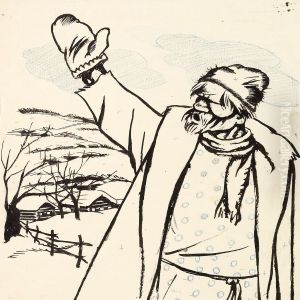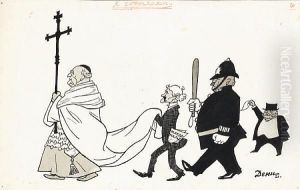Victor, Deni Denisoff Paintings
Victor Nikolaevich Denisov, also known as Deni, was a prominent Russian and Soviet artist, renowned for his career as a caricaturist and poster artist. Born on March 10, 1893, in Moscow, Denisov was a key figure during a significant period in Russian history, witnessing the fall of the Tsarist regime and the rise of the Soviet Union.
Deni began his artistic journey with an education at the Stroganov Moscow State University of Arts and Industry, followed by the Moscow School of Painting, Sculpture, and Architecture. However, it was the tumultuous political climate of Russia that shaped his career and directed his talents towards political art. He started working as a caricaturist for satirical magazines before the October Revolution of 1917, but his work gained prominence in the early Soviet period.
Deni's most influential period was during the 1920s and 1930s when his propaganda posters became widely recognized as part of the Soviet government's efforts to communicate with the illiterate masses. His posters were characterized by their bold graphics, striking use of color, and often incorporated text that conveyed political messages. Deni worked alongside other notable Soviet artists like Dmitry Moor and Alexander Rodchenko, contributing to the visual language that defined Soviet propaganda art of that time.
During the Russian Civil War and the subsequent years, Deni's work played a crucial role in the Bolshevik propaganda machine. He created a significant number of political posters that depicted the enemies of the Soviet state in a negative light while glorifying communist leaders like Lenin and Stalin. His style was direct and accessible, designed to evoke an immediate emotional response from the viewer.
Despite his contributions to Soviet art and propaganda, Denisov's career faced challenges during the Great Purge in the late 1930s, when Stalin's regime targeted many artists, writers, and intellectuals. While Deni managed to survive this dangerous period, the later years of his life were less prominent as the state's support for his style of work waned.
Victor Nikolaevich Denisov passed away on August 3, 1946, in Moscow. His legacy is marked by a significant body of work that provides a unique window into the history and politics of the early Soviet era. Deni's posters remain studied and appreciated for their artistic merit and historical significance, illustrating the powerful role visual art can play in shaping political discourse.

